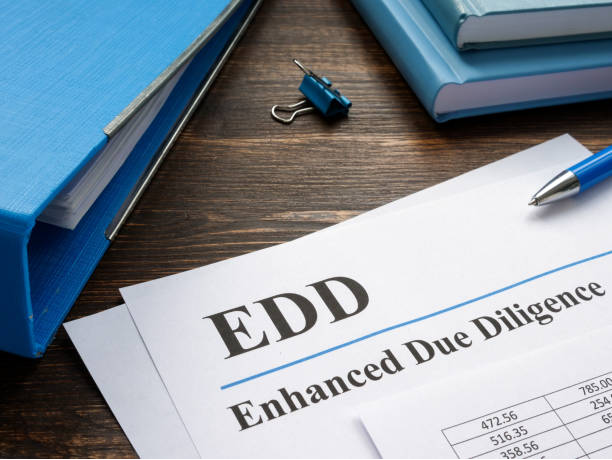Financial institutions like banks are always at risk of getting caught in the fraud and monetary losses caused by businesses. Companies often take huge loans from the banks and do not pay them back, and sometimes vanish after getting the money. Thus, banks comply with Enhanced Due Diligence and many verification processes to ascertain the business.
There is also a business that encounters bank fraud. According to the studies, 71% of businesses “were victims of payment fraud attacks or attempts in 2021. It discovered that accounts payable departments are the most vulnerable to business email compromise (BEC) scams. Fraudsters use fake identities, synthetic identities, cyberattacks on account creation, or identity spoofing for account takeovers.
Thus, financial institutions and businesses require Enhanced Due Diligence to deter fraud. It optimized the overall security and enhanced business protection against these kinds of threats. It ensures protection from financial loss and finds out if they are intrigued by money laundering.
This article will explore the substantial understanding of enhanced due diligence. It’s a checklist, requirements, benefits, and, most importantly, if it’s incorporated with the KYB.
What is Enhanced Due Diligence?
Enhanced Due Diligence (EDD) is a critical process that is used for mitigating risks by exhaustively investigating high-risk business entities. As a primer to Know Your Business (KYB) compliance, it goes beyond standard due diligence. It verifies the business credentials and the ownership structure. It also authenticates the UBO and certain business activities to ensure robust security. EDD is essential for identifying potential fraud as it determines whether the company is involved in money laundering or any other regulatory violations.
In the strict KYB practices employed by financial institutions, EDD has a tough job of ensuring financial security. The key factors, such as jurisdiction, company structure, and beneficial ownership, further influence the level of scrutiny. Along with this, Enhanced Due Diligence ensures that businesses meet global compliance standards. It protects against illicit activities and enhances trust in corporate and financial transactions. It is especially vital in massive industries like finance to secure transactions.
The Optimal Process of Enhanced Due Diligence Checklist
The optimized process of Enhanced Due Diligence (EDD) in KYB is crucial. As it identifies and manages threats associated with high-risk clients. The process can be divided into several important steps to better understand it:
- Identify High-Risk Entities: Categorize clients with risk indicators such as geographic location, transaction flow, or business activities.
- Deep Investigation: Collect all the information that needs to know regarding ownership structure, financial history, and industry operations.
- Beneficial Ownership: Create more clarity through the identification of all the people with significant control or stake over the business
- Transaction Pattern: Track monetary transactions to determine any aberrant or suspicious behavior.
- Legal Compliance: The business ensures that all relevant regulatory provisions and industry practices are complied with.
- Documentation of Observations: Exact accounts of the EDD process, and risks identified are made for review purposes at regular periods end.
Enhanced Due Diligence Requirements—Documents for KYB
To ensure KYB compliance, businesses should obtain the following documents to carry out Enhanced Due Diligence:
- Business registration documents
- Financial statements
- Ownership structure
- Identification of beneficial owners
- Tax identification number (TIN)
- Proof of address
- Relevant licenses and permits
- Company policies (AML & CTF)
Benefits of Opting for EDD Enhanced Due Diligence
The Enhanced Due Diligence for the KYB offers numerous benefits and shows how crucial it is for businesses to comply with regulations, such as:
- It offers a comprehensive scrutiny of business entities, revealing all the risks possible in their ownership structure and operations.
- It aids in identifying and addressing potential dangers linked to the laundering of money and other types of financial fraud.
- It builds confidence in the stakeholders by exhibiting a commitment to compliance and transparency.
- It ensures that legal requirements are met, thus avoiding legal action against a business enterprise.
- It protects the reputation of the business due to responsible due diligence practices.
Best Practices for EDD Compliance in KYB
The EDD policy shall be highly comprehensive and summarizes the precise criteria as well as requirements. Based on companies must be examined to converge with the EDD requirements in Know Your Business(KYB). Training employees about risk awareness and due diligence procedures enhances their vigilance to detect potential threats. Moreover, reviewing due diligence procedures regularly organization up to date with any new requirements appearing in the state policy. It will adapt according to the risks prevalent by promoting a vigilant and responsible culture.
Enhanced Due Diligence (EDD) is crucial for protecting businesses from hidden risks associated with financial fraud. Organizations can find potential threats by implementing robust due diligence procedures. It makes sure they follow regulations and protect their reputations. EDD makes security measures stronger and also builds trust among stakeholders. This ultimately makes the financial environment safer for everyone involved. The Blog pocketmemoriesnet
FAQs
- What is the difference between due diligence and enhanced due diligence?
- Due diligence is a standard process of assessing a business or individual for potential risks, while enhanced due diligence involves a more in-depth investigation, typically for higher-risk entities or transactions.
- Are there specific industries that require more stringent due diligence measures?
- Yes, industries such as finance, cryptocurrency, real estate, and gambling typically require more stringent due diligence measures due to higher risks of money laundering, fraud, and regulatory compliance concerns.
- What are the consequences of failing to perform enhanced due diligence?
- Failing to perform enhanced due diligence can lead to legal penalties, regulatory fines, reputational damage, and increased exposure to fraud, money laundering, and financial crimes. It may also result in the loss of business licenses or operational restrictions.
